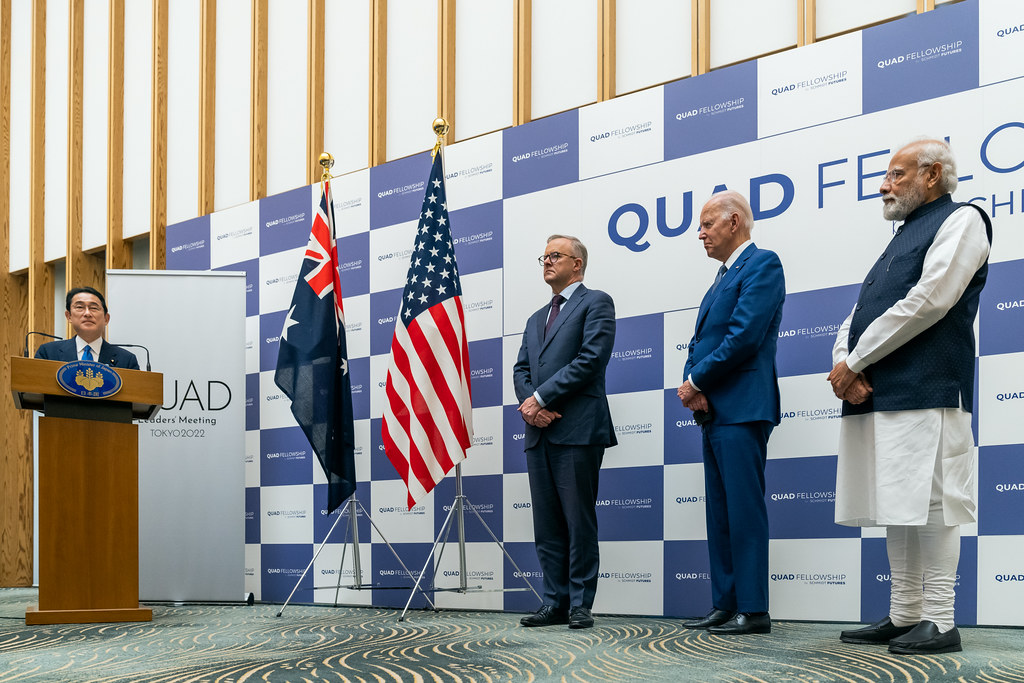Japan appears to be using the Quad to pursue its ambitions to promote domestic 5G network players.
5G, or “advanced telecommunications” and “critical and emerging technology” in Quad parlance, is one of a small handful of policy initiatives to be addressed at all five Quad leaders’ summits, along with issues such as health and clean energy initiatives. Tokyo has been at the forefront of the group in keeping 5G as a critical technology a consistent focus.
Why?
5G network technologies are currently dominated by four companies. From Europe, Sweden’s Ericsson and Finland’s Nokia, are the trusted suppliers for many Western-aligned 5G networks. The competition they face is China’s Huawei and ZTE. These four companies – a corporate “quad” if you will – along with a smaller share from South Korean firm Samsung, together control more than 95% of the global 5G network equipment market.
Through the Quad, along with other diplomatic entities, Japan is seeking to promote its own 5G national champions. Equipment manufacturers NEC and Fujitsu, plus mobile network operator Rakuten and others, are each pursuing Open Radio Access Network (Open RAN) technology, which they and the Japanese government believe will enable them to compete in the highly 5G concentrated market.
Japan has been the Quad’s driving force on this issue.
Open RAN is an alternative architecture for what is known as the last-mile connectivity within telecommunication networks – essentially the part that connects customers with the broader global system. Traditional RAN networks require the same equipment vendor to supply the full suite of hardware and software. Entering the traditional RAN equipment market is therefore extremely difficult, as aspiring vendors need to develop, at vast expense, end-to-end solutions. Open RAN, as a disaggregated network architecture, is designed to allow multiple vendors to supply individual components into the same network. A Fujitsu antenna would work with Rakuten software and NEC base stations, for example. Companies can therefore focus on developing specific components, rather than an entire RAN network.
Seeing the promise of Open RAN to create opportunities for domestic companies, the Japanese government has repeatedly highlighted the technology in Quad meetings and communiques.
At the 2023 leaders’ summit held on the sidelines of the G7 in Hiroshima, for example, the four member states announced that they will partner with Palau to design, implement and operationalise the deployment of Open RAN capabilities in a project to modernise Palau’s national mobile network. The aim was to “enable greater vendor choice”.
By “vendor choice”, the statement is really saying that the Quad leaders want new choices. Preferably from their own countries.

Through trailing Open RAN kit, Japan via the Quad hopes to encourage other nations to adopt the technology. The Quad leaders also issued an Open RAN Security Report, commissioned and financed by the Japanese Ministry of Internal Affairs and Communications, and written in cooperation with Japanese industry partners, including a mobile network operator. The report was unsurprisingly positive. Pushing back on criticism that Open RAN is less secure than a fully integrated traditional RAN network, the report stated that the risks are not significantly different.
Japanese companies are active in seeking to capitalise on government support. At the 2024 Mobile World Congress in Barcelona, Japan’s largest network operator NTT Docomo and tech company NEC announced a joint venture to grow their Open RAN business with a focus on Southeast Asia and the Middle East. The venture will launch three international trails of Open RAN in Singapore, the Philippines and Qatar. The first trial, taking place in the Philippines is being partly funded by the Japanese government, with construction to begin within months. In Japan, meantime, Rakuten is among the first companies to deploy an Open RAN network anywhere in the world.
The promotion of Open RAN at the Quad is not new. In 2022, the group announced that it would “advance interoperability and security through the signature of a new Memorandum of Cooperation on 5G Supplier Diversification and Open RAN.” Similarly, the first ever Quad Leaders’ Summit held in 2021 agreed to “support 5G deployment and diversification”, primarily through Open RAN.
Outside the Quad, Prime Minster Fumio Kishida has promoted 5G/Open RAN technology in several prominent international speeches.
Through it all, Japan has been the Quad’s driving force on this issue. While the US has a handful of companies such as Mavenir which it has sought to promote through similar actions to Tokyo’s, Japan has been the leader.
Whether Japan achieves success in promoting its champions through the Quad remains to be seen, but Tokyo is showing no signs of giving up.

